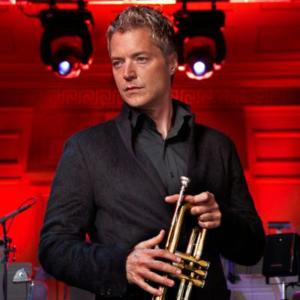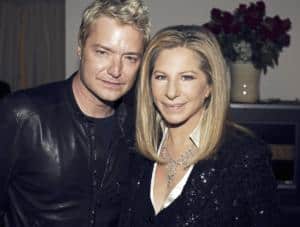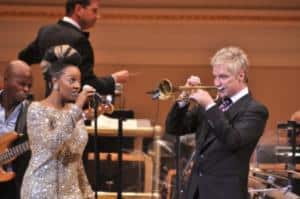Chris Botti: “You look out there, and there are twenty people in tears” – The 13th Floor Interview
Jazz trumpeter Chris Botti makes his New Zealand performing debut at Auckland’s Bruce Mason Centre on February 21st.
The Grammy Award-winning musician is one of the most-traveled artists on the planet, often playing up to 300 shows a year. Along the way, he has collaborated with a host of musicians including Paul Simon, Sting, Mark Knopfler…even Frank Sinatra.
The 13th Floor’s Marty Duda spoke to Chris Botti recently and asked him what Kiwi audiences can expect from his show when it finally arrives here.
Click here to listen to the interview:
Or, read a transcription of the interview here:
CB: Oh my goodness! We are so looking forward to coming to New Zealand. I’ve never been there, and I’m so looking forward to it!
MD: With all the touring you do, you must find it hard to find a place that you haven’t been to yet?
CB: Yeah! Once we get New Zealand done, hopefully, one of these days, I’ll be able to get Vietnam and India, and then that’ll, pretty much, be it.
 MD: I was trying to remember if you had been here before, and I thought, “Well, you must have,” just simply by the fact of how much time you spend on the road; so, there you go. Is there anything that you do to prepare to approach a new territory like New Zealand…?
MD: I was trying to remember if you had been here before, and I thought, “Well, you must have,” just simply by the fact of how much time you spend on the road; so, there you go. Is there anything that you do to prepare to approach a new territory like New Zealand…?
CB: No. Whenever I walk on stage: in baseball, in the States, there’s that] New York Yankees, and they all touch the emblem before they walk on stage, and I – in my head – when we walk onstage in a new place, am just very, very grateful that there’s an audience there. We love touring – I’m on the road about two hundred and sixty five days a year – and so, I view it as a great privilege to walk onstage and have people there.
MD: It is amazing, especially in this day and age, where everything is intertwined by the internet, it’s not that difficult to get a hold of your music no matter where you are in the world; it’s just a matter of connecting with them at some point.
CB: Yeah! Even though the record business is in chaos, the power of people tweeting out, “Hey, I went to the Chris Botti show tonight. If you get a chance to go see him, go see him.” That has made such a great impact on growing our audience…. Back in the day, I’d have people, from a newspaper, reviewing my show, and then it would come out, two days later, in the newspaper. Nowadays, it’s just instantaneous, and everyone’s writing a review of the show all day long; so, that’s been really nice: … having that very grass roots fan base.
MD: I would imagine – for an artist like you – having the grass roots response is, probably, a more accurate representation of what you do, than somebody from some newspaper that has preconceived notions, and writes about everybody all the time.
CB: Absolutely! The other thing is that I’m an artist – even though we do long form, PBS shows, and stuff like that; and that’s been really good for me – I’m not interested in going on America’s Got Talent. The mainstream, Kardashian impulse of American pop culture is based on hip-hop, and all that other stuff, and I’m not that artist. I have my niche, which is – thankfully for me – a big one, and we just do it old school style and go out with this incredible band, that I have, and three special guests that tour with me; and so, we just do it word of mouth, and it’s growing; so, we’re happy to come to New Zealand.
MD: Speaking of mainstream pop: did you happen to look in on the Grammys at all? Did you pay attention to that?
CB: No. We were playing in New Hampshire that night. I saw the highlights of it the next day. You know, it’s a television show – that thing is – for young people, and more power to them; it’s great. They stopped – a long, long, long time ago – having anything to do with classical music or jazz, and I think that that may be… you know? But I can understand their point of view: they’re trying to reach that demo of twelve to thirty, whatever; so, whatever!
MD: It seems like they never make those people happy either; so, no matter what they do, they seem to have annoyed somebody. It’s just a never ending thing.
CB: Yeah. It’s very fickle…the bands that were big, three or four years ago, like Fun or Foster the People: I don’t even know where they are now…! There’s a great quote that Jay Leno had… where he said, “If you can stand your own act for seven years, then that’s day number one of being in show business;” and he’s still right on the money on that stuff: longevity is really the key, and also not to self destruct – we see a lot of artists self destruct as well – so, I think that those were good words that I always remember, that Leno said in an interview one time.
MD: Self destructing is interesting, because, let’s face it, what you do – you’re a jazz trumpet player – there’s a long line of self destructive artists in that field of interest, that goes way back. How do you avoid that? Is it a personal thing? Is it something that you have to make a concerted effort about? How do you view something like that?
CB: … There’s the self destruction thing, like substance abuse, but Leno was really referring to, “Can you stand… rolling this thing out to this audience, and make it feel fresh for me?” and not self destruct, by just going, “You know what, I want to take a year off.” Because I could, if I wanted to, but I love it so much. We just finished a run at the Blue Note… back in New York, and we did fifty six shows in twenty eight nights; so, somewhere around show twenty nine or thirty five, or something, I’m going, “Oh my god! I can’t believe I’m telling… the same thing, and I’ve got to feel like it’s rolling off the tongue, fresh,” there is a little bit of a challenge to that, but ultimately, it’s a great pleasure to be able to do that.
MD: Have you never wanted to do any other kinds of music, or thought about doing anything else other than what you’re doing? Has this always been what you’ve wanted to do?
CB: Well, I started out as a real hardcore jazz musician, and then being able to branch out – and, in our show, do classical stuff, or opera stuff with our singer, or rock stuff, whatever – I’ve crafted that over years of being around people like Sting, and seeing how they work. That has been an adult muscle that has been fine tuned over many, many, many years of touring…. I’m not really looking to go out and do a duet with Drake, or anything like that. I’m cool; I’ve worked with enough people. I’ve worked with enough people; I don’t necessarily need to push that boundary; but other than that, I’ve, pretty much, collaborated with everyone from Sinatra to Bocelli to Sting, [etc]; so, I feel very lucky in that department.
MD: When you do collaborate with somebody: as a trumpet player, how does that work for you? Is there a ‘give and take’? Do you come in with a set idea about, “This is what I’m going to do. This is my part in the thing, and they’re going to do their part.” How does it usually work for you?
 CB: Oddly enough, the trumpet leans up against the voice really beautifully, because you can play underneath…. We did a few shows with Barbara Streisand – four years ago now – … if it was another voice up against her, then you’ve got to navigate room… but I could just play right underneath her or over on top of her, around her, stuff like that, and it worked so perfectly that way. The trumpet… can be very lyrical and in the way – as far as making a statement – and it can also duck away and let someone else make a statement; and that, you just get the trick for over years of practice, I suppose.
CB: Oddly enough, the trumpet leans up against the voice really beautifully, because you can play underneath…. We did a few shows with Barbara Streisand – four years ago now – … if it was another voice up against her, then you’ve got to navigate room… but I could just play right underneath her or over on top of her, around her, stuff like that, and it worked so perfectly that way. The trumpet… can be very lyrical and in the way – as far as making a statement – and it can also duck away and let someone else make a statement; and that, you just get the trick for over years of practice, I suppose.
MD: How did you come about choosing the trumpet, initially, to play anyway? There are all sorts of options when you’re a youngster. Was there something that drew you to the trumpet?
CB: Yeah, yeah, yeah! I saw Doc Severinsen on television – he was the host of the Tonight Show band. That was when I was in third grade – so, that’s the initial spark that got me to pick up the trumpet and try to learn how to play it – but, when I was twelve, I heard Miles Davis, and then a light switch went off, that this instrument could really make people feel melancholy; and I think that the great trumpet players: there’s that heart break in them. Miles being at the top, Chet Baker – we know everyone goes with the same people – but that element of heart break is paramount to me in my life, and I love the trumpet when it’s played in that way. Yes, I like to play fast bebop stuff, when we want to, and all that stuff, but when you can move people’s emotions – you know? I’m on the front of the stage, and you look out there, and there are twenty people in tears for the right reasons – then it’s a real nice feeling.
MD: How did you find your own ‘voice’ with the trumpet? Did it take a while? Did you know it when it happened? Because, at some point, you’re going to, obviously, sound like the people that you admire, and then, at some point, you’re going to be who you are.
CB: I don’t know when that actually happened, but I’ll tell you something: in my mind, it’s unattainable. I still practice four or five hours a day, and I’m always trying to refine it, to try to make the shine on the instrument, the tone, more beautiful, more lyrical; and I’m proud to say that I’m a much better trumpet player, now, than when I first released my first record, which has been twenty three years. I’m always working on refining the show, reworking the band, getting better players. Now, I know that we’re coming to New Zealand with the best band I’ve ever had: it’s just an all-star, crack-up band, and a fantastic concert violinist and two singers. There’s the part of my show that’s a show, and there’s a part of my show that’s the trumpet playing, and there’s a part of my show where I’m featuring other people. There’s a whole mess of stuff going on, and I’m always trying to refine that; daily, actually.
MD: Who else is in your band? Tell me a little bit about the configuration that’s coming around when you get here.
 CB: It’s my all-star rhythm section, which is Lee Pearson on drums, and Geoffrey Keezer is playing piano, and a fantastic Brazilian guitar player, Leonardo Amuedo; and then we have three special guests: we carry a crossover opera singer, kind of like Bocelli, named Raphael Moraes, and Sy Smith sings with us – she’s been with us for long time – and then this amazing classical violinist, Sandy Cameron – you can find her stuff online – she’s just incredible; and so, she’s one of the featured guests as well. It’s a show, and, like a lot of people, they know when they go see U2, they’re going to see the four guys onstage playing The Streets Have No Name; but with me, if they haven’t seen one of my shows, they think, “Well, is it just you onstage with a trumpet?” They have no idea; so, there’s little bit of a learning curb, to tell them that it is a show that crosses all these different genres of music, and performed by people at the highest level of artistry. That’s, in a nut shell, how I try to sell it, and sorry if I sound like a blow hard.
CB: It’s my all-star rhythm section, which is Lee Pearson on drums, and Geoffrey Keezer is playing piano, and a fantastic Brazilian guitar player, Leonardo Amuedo; and then we have three special guests: we carry a crossover opera singer, kind of like Bocelli, named Raphael Moraes, and Sy Smith sings with us – she’s been with us for long time – and then this amazing classical violinist, Sandy Cameron – you can find her stuff online – she’s just incredible; and so, she’s one of the featured guests as well. It’s a show, and, like a lot of people, they know when they go see U2, they’re going to see the four guys onstage playing The Streets Have No Name; but with me, if they haven’t seen one of my shows, they think, “Well, is it just you onstage with a trumpet?” They have no idea; so, there’s little bit of a learning curb, to tell them that it is a show that crosses all these different genres of music, and performed by people at the highest level of artistry. That’s, in a nut shell, how I try to sell it, and sorry if I sound like a blow hard.
MD: No, no! Let her rip, especially since you haven’t been here before. A lot of people will have no idea what to expect from your live thing; they’ll only know the records. Speaking of records: the last thing that you’ve done was Impressions, which, of course, won the Grammy, but that was quite a few years ago. Have you got any plans to record again, or are you spending too much time on the road?
CB: Last Friday, we just filmed a brand new PBS special, Great Performances, and that will document – on album and DVD – the last four or five years of touring, and then, next summer, I’ll try to think about what I want to do as far as the new record. The record business is changing by the hour, and not for the best. It’s becoming more obsolete, in a lot of ways. I’m in a good position where I can make records and just give them to my fans, if I want, basically as a post card for our live shows; so, we’re just trying to figure out the right way to do that, and what company or not company we should do.